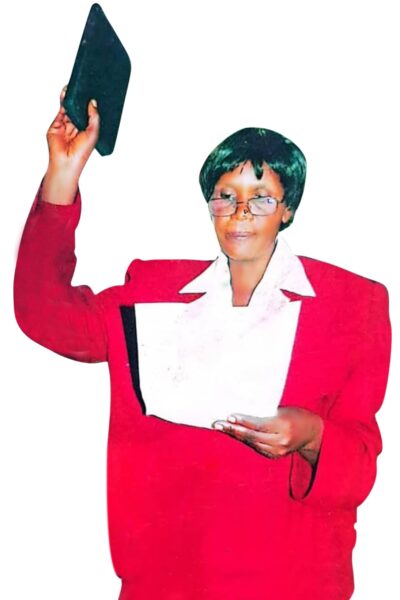Empowered Voices: Women leaders in Fort Portal City challenge norms to combat gender-based violence
BY: HOPE LEONTINA.

IN the heart of Fort Portal city, a remarkable narrative of resilience and leadership is unfolding as women have spent decades defying societal norms to become village chairpersons.
Far from being mere figure heads, these trailblazing women have harnessed their positions to address the pervasive issue of gender-based violence in their communities.
Their journey has been one of breaking barriers and defying odds, proving that women can be powerful agents of change when allowed to lead.
For certain individuals, the belief is that where women have been village chairpersons, cases of gender-based violence have been addressed to further reduce their chances of happening and they argue that an increase in the number of women in leadership roles at the village level could potentially strengthen a network of village women.
The idea is that women in leadership positions may bring a unique perspective and dedication to addressing such societal issues, fostering a supportive community network to tackle GBV and promote safer family environments.
Ms Margret Rwakiziba, 58, a resident of Kasusu cell in Central Division, Fort Portal Tourism City, has served as an area chairperson for the past 30 years and she noted the initial challenges of a tough election but emphasized that her subsequent nominations were unopposed, illustrating the acknowledgment of her leadership capabilities.
“I have held this position for the past 30 years. The first time I entered the election, it was a challenging contest against other candidates, and I emerged victorious. Since then, as people tested my potential, it became evident that leadership is a calling. In one of the subsequent elections, I was nominated unopposed,” She said.
Over the past 30 years, she noted that the area has witnessed numerous developments under her leadership including population growth, bringing people with diverse behaviors.
“When a case is brought to my attention, I make it a priority to listen to both sides – both the man and the woman involved. As a leader and a parent figure, I aim to harmonize their perspectives. By the end of the discussion, neither party feels the need to escalate the matter to the police or other authorities. Instead, they leave my office content, and a family that was on the verge of collapse is reunited,” she shared.
Commending the government for encouraging women to participate in elective politics, she also emphasized the necessity for additional training.
Expressing gratitude for the opportunity given to women in leadership, she envisioned advocating for increased training initiatives.
Moreover, if she were in a top leadership position, she would champion for higher salaries for all village chairpersons, recognizing their diligent efforts in community service.
In her three-decade tenure of leadership, she attributes her continued role to the respect and transparency she maintains with the people she leads and her openness has facilitated her work, particularly in gathering necessary information from her community.
When asked about balancing marriage and leadership responsibilities, she credited her husband’s support, stating that he backed her even before she entered leadership.
“We have produced children together who are now adults; they even support me in some of the previous campaigns by seeking votes on my behalf. At night, in case there is an emergency in my area, we walk together. So, my family is supportive,” she explained.
Leading a society alongside men has taught her the importance of respecting all individuals regardless of gender and said the approach has garnered her respect within her community, shaping her leadership style.
Ms Rwakiziba’s story mirrors that of Ms Bahemuka Immelda Atwooki, the current local council chairperson of Kidukukuru Kihembo cell in Central Division, Fort Portal City, who has served for the past 34 years.
Ms Bahemuka shared that her extended tenure as chairperson has been made easier because her community understands her character, preferences, and dislikes.
“For the last 34 years, I have worked as the Chairperson of this cell, the work has been easy because people have learned my character, what I want, and what I don’t want. This is why sometimes they come to get me from home to go and vote for me even when men are contesting,” Immelda expressed.
With her effective leadership, residents have affectionately nicknamed her “mum,” symbolizing the equitable service she provides.
As a woman leading a community that includes males, residents feel comfortable reporting family disputes and misunderstandings of gender-based violence to her, confident in her successful resolution of such cases.
“When a man approaches me with a misunderstanding with his wife, I handle the matter independently without involving the entire executive. Drawing on my experience, I guide them through the issues, and often, they find themselves in love again. Many couples are happily married because of my counseling,” she said.
Her role as the head of security at the village level has eliminated any fear of responding to calls at any time saying her readiness to respond promptly, and when encountering people with concerns, she provides explanations to address their queries.
Ms Mugisa Grace, another leader, has been heading Rwengoma Cell I for the past 28 years. She attributes her enduring leadership to trust and transparency, prioritizing people’s privacy and assisting in problem-solving at the local level.
“Frankly speaking, as a woman, I tell the truth and correct where necessary. The youth are more cooperative than elders, as some elders used to believe that they, as men, could take the lead,” she noted.
Handling security matters, especially at night, Ms Grace says she prefers to address non-emergency cases during daylight hours.
She exercises caution when dealing with nighttime situations, advising people to return in the morning, and said when necessary, she mobilizes her defense and other members of her committee to collectively address the issue.
Mr Bagenda Richard, a male resident, expressed his positive experience working under the leadership of Ms Margret Rwakiziba for the past 17 years in the Kasusu cell. He commended her for consistently exhibiting excellent leadership skills and stated that he had not encountered any problems during this period.
“If she were my wife, I wouldn’t have any issue with her; instead, I would encourage her to continue. She has motivated us to work hard, and it is due to her good leadership that people vote for her, expecting quality services,” he remarked.


